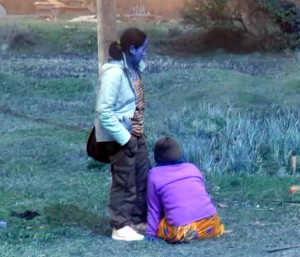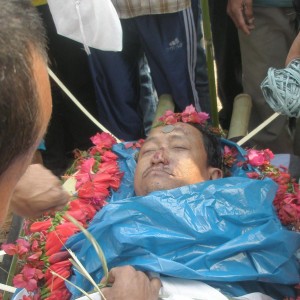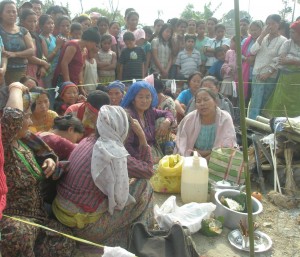Reporting death and life
It was 5:30 am. The darkest hour before the dawn happens just at this time. Outside the thatched little bamboo hut in a refugee camp, it was pitch dark, but still calm. On a cool February 20 morning like this, nothing suggested that the peace of the camp residents had been devastated by, yet another incident of horrific tragedy. That hut belongs to my parents and I often use it as a place for my temporary sojourn, during my visits to the refugee camps. Here, I was still awake and discussing family matters with my elderly parents.
Suddenly, my cell phone started ringing. Phone calls at this hour are mostly unusual for any person, even a journalist. The call was from IndraTimsina, a fellow journalist. Before, he spoke I could smell something dead serious had happened. “Did you hear that Ramesh Subba was shot dead last night near Kakarvitta?” he questioned straight. Of course, I had not.
Last night, like any other nights, could have been a regular night for any resident of the camp, but for Aiti Maya Subba of Beldangi I, it was a long and horrendous nightmare. She tried not to believe what had transpired and hoped for a heavenly hand in reversing the clock of time.
What a terrible coincidence? I was there in the refugee camp after several months. The last time I visited the camps was in November, when I was preparing a follow up news on the slaying of former Camp Secretary of Beldangi-II Extension, K.B. Khadka. This time, it is the slaying of yet another Bhutanese activist. Co-incidentally both of the diseased happen to be ex–Camp Secretaries in the same Beldangi area.
Is there any connection between these two deaths; no one knows, at least for now. In both the cases the assassins have safely gone free. The weakness of the government of Nepal to track and punish the perpetrators, it seems, have encouraged these anti-social elements to freely operate in the camps as they like. The refugee camps have become their safe heaven and a practice ground. It is not clear who is operating the ‘death machines’ that seems to knock down the Bhutanese activists. This is the third in a row since last year. A query will need to be made soon. Are the Bhutanese people victims of internal contradictions of their own or is there an outside hand in these incidents?
Following the telephone call from Timsina, I dialed Camp Secretary of Beldangi-I camp, T. B. Gurung, who confirmed the shooting. “I am in the Zonal Hospital, Bhadrapur, waiting for postmortem of the dead body” Gurung said. His voice was melancholy, faint and low, filled with insecurity and grief.
I urgently called my brother in New York City for the news update. Unfortunately, he could not be reached. In the next step, I sent text messages to Vikram Adhikari and Ichha Poudel in Australia, both journalists associated with Bhutan News Service. Within no time, Poudel made a call for the details and we were able to furnish the breaking news to the readers of Bhutan News Service worldwide.

Aiti Maya laments helplessly outside the postmortem building in Bhadrapur. Her neice stands besides her.
Accompanied by a friend, I then left for Bhadrapur Hospital, where the slain body of Subba lay rested. It took us less than an hour to travel what could be normally a two hour journey, on a motor bike. There I met T. B. Gurung, the Camp Secretary. Gurung looked frail and agonized. What a twist of events; just some hours back, we were together at the Beldangi-I fire aid distribution program, and now we both were here to witness one of the most unexpected and horrible scene.
Gurung was standing in front of the building where the postmortem was to take place. There were three other people in the same complex including diseased Subba’s wife and their niece. I sensed that they had not even been contacted by the police in Kakarvitta, which was ferrying the dead body for postmortem. With a few trial hits to some local journalists, I could catch hold of the Police Inspector at Kakarvitta. Devi Thapa, the Police Inspector was candid in sharing information about the tragic incident. He told me that police has recovered two cell phones, a wrist watch and 15,000 cash from the spot.
I started my investigative reporting after a brief introduction to Subba’s wife, Aiti Maya Subba. Her eyes were swollen and red, and face half closed with her shawl. I could see tears trickling down her checks as she mustered courage to speak.
“It was just about 7 p.m. last night when my husband called me. He was out of contact for almost a month. He talked to me a month ago. Now he is no more.” She bemoaned and then closed both her eyes with her palm and started crying. It was intimidating to see a human being crumble in the face of grief. Perhaps she felt the pain of her own life disintegrating into pieces.
“He asked how our son was doing. I said, he is well and fine. He told me that he met Bidhur (name changed), also at large and hunted by the police. I was scared when he said that. I even asked why he had to meet Bidhur. He explained that Bidhur was his junior and their relationship was trouble free. They can kill you, since there existed a conflict between the two of you, I said.”
And then she paused, paused for a long time before she continued her story.
“We talked for less than five minutes. I could remember him telling me that he would stay a night with our relative Phul Maya. No voice was heard after that. I thought he was in a bus. All I could hear was some disturbing noises. But, the telephone was not disconnected. I tried to say ‘hellow’ to him a number of times. But, he did not reply. Then, I cancelled the call and dialed his number a number of times, but in vain. Finally, I got tired and slept.”
“It was around 12:00 midnight when I received nonstop calls on my cell phone. Every time I tried to receive it, the line got disconnected. Again, the phone rang. I guessed it could be my husband trying to call me. Usually, I am afraid to receive calls at odd hours like this. Such calls are potently laden with bad news. When I received the call, a voice from the other end said that ‘your husband is no more’ – hell broke lose for me.
She started lamenting helplessly. “I am without any body. There is no one to feed my family. How can I set my eldest son Bir Bahadur free from jail, since his dad is no more?” Listen to the audio below.
“My husband was talking to me when the snipers shot him. Last month, he promised me that he would arrange some money in the amount of ten to fifteen thousand to help release our son from prison. The money police recovered from his body was for this purpose.” She could talk no more. But she was straight and strong.
A team comprising of police and medical personnel reached the postmortem building. Life offers some intriguing ironies. Our most close and loved individuals are the ones who dearly love us while we live, they are the same ones who dig the grave or lit the funeral fire.
Someone in the first row opened the door. A policeman unrolled the clothes from his body. I could see the dead body – lying still, naked and soaked in blood. Such a scene could easily shake the minds and hearts of any mortal being. The policemen then, asked Aiti Maya to enter the room. All of us entered. Soon, the scene became bitter and chaotic. Aiti Maya hugged her husband and started crying on top of her voice. She sweared “Babu, who has dared to do this; God will take revenge for this.” It became very difficult to calm her down. So, her niece walked her Maya out.
These were scenes which even a journalist cannot dare to encounter. It took great courage for me to do my reporting. Nonetheless, some of those scenes became the shooting spots for a journalist’s camera. I took some photographs and video clips and left the scene.


